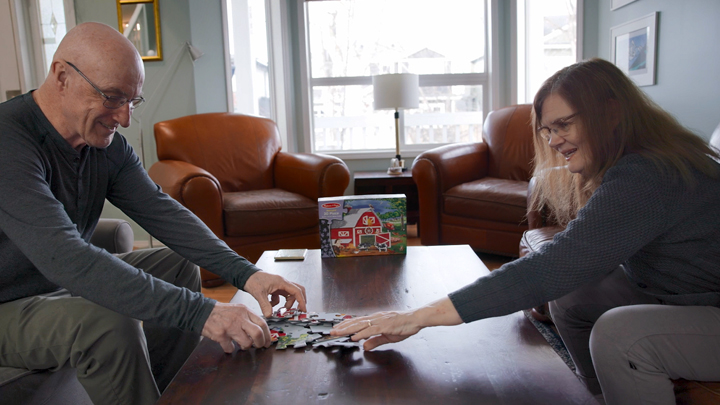
April 2, 2024

Fred and Laurel Sproule reminisce over the 30-piece jigsaw puzzle that started Fred’s recovery journey. Photo by Evan Isbister.
Story by Landis Reichle | Photo & video by Evan Isbister
EDMONTON — It’s been 11 years since Fred Sproule suffered a debilitating stroke on the heels of a heart attack. Since then, his wife Laurel has been his caregiver.
Fred and Laurel were both teachers before Fred’s stroke; she taught Shakespeare and he took students on field trips to the opera. Laurel brags that Fred was, and still is, the most brilliant person she’s ever known. With such accolades, it’s hard to imagine that little more than a decade ago, Fred didn’t know what a lion was.
For the first few months of recovery, Fred felt frustrated with his inabilities, but knew he wasn’t the only one facing a learning curve, “At first, I didn't accept it. I didn't understand that I couldn't do something. She had to do everything from driving to setting up the TV channels. Laurel had never done much of that before, so the biggest change was for her.”
“It was probably the cruelest thing that could have happened,” says Laurel. “There was so much he had lost. One day I said, ‘go in the kitchen and make yourself a sandwich’, because we hadn't eaten anything and I came back down and he was holding two pieces of bread and said, ‘I don't know what to do’.
“It was difficult emotionally, and as a teacher, I think I was an awful taskmaster. I didn't have a clue what to do. I didn't know what I was dealing with, or how to deal with it.”
With so many changes to their everyday lives, their relationship changed, absolutely. Looking back, today they both agree that their relationship improved.
“We ended up in a much better relationship. We actually ran together, and we ran the New York Marathon about a year afterwards,” says Fred. “That was a really rich achievement.”
“We were told he’d never run again,” Laurel adds. “People thought we were crazy to run a marathon a year after his stroke, but we did it. We proved them wrong.”
Reflecting on his experience, Fred thinks about the best advice he could give to a caregiver, and laughs: “Don't ever use the word ‘just’. But honestly, don't make assumptions about what the other person can do. Accept the person at the level they're at. And don’t ignore what’s happened to them because it’s uncomfortable. They need you.”
While caregivers allow Albertans to be as healthy and independent as possible by taking on emotional and physical responsibilities, it’s also important for their well-being to be supported in their new role.
Laurel says she hopes caregivers can find their own support person, like she did.
“There's been challenge after challenge, but we had a wonderful person come into our lives, and she just said, ‘you guys are doing great’. That just meant the world to me, somehow. So, know that there is life after. It's probably not the one that you remember, but it can be great, if not better.”